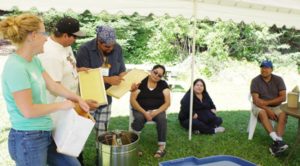Wee Tum Ma Keh Wina Food Symposium fed the mind, soul, and body

By Rick Garrick
THUNDER BAY—Debajehmujig Theatre Group’s Joseph Osawabine recently learned how to cook geese at the Wee Tum Ma Keh Wina Food Symposium, held on August 23-25, 2016, at Camp Duncan near Thunder Bay, Ontario.
“I was right in there learning how to spin the goose on the string that it was hanging on [over the fire],” says the artistic director of Debajehmujig. “I don’t know why we don’t eat them more often [on Manitoulin], they were so good. They cooked them over the fire — I’ve never seen it done quite like that before. It was delicious.”
Osawabine and three other Debajehmujig staff, Bruce Naokwegijig, Tabitha Peltier, and Ashley Manitowabi, attended the Food Symposium to deliver two Food for Thought workshops and an evening storytelling performance.
“We’re here to learn as well,” Osawabine says. “We’re moving towards sustainable practices and land-based art. We have a company garden back home where we are learning about permaculture principles and traditional practices as well, so it is an opportunity for us as artists to learn new skills and bring those skills back home as well.”
Osawabine also took the opportunity to listen in on the bee workshop by Roots to Harvest, which has set up a couple of beehive sites in Thunder Bay.
“We’ve been having talks back home about having bees and it just so works out that all the workshops here are things we are interested in too,” Osawabine says. “But it will also inform our presentation tonight.”
The Debajehmujig staff delivered the Global Savages presentation during the evening storytelling performance on the second day of the Food Symposium.
“It’s an 18,000-year animated oral history of the Indigenous people of North America,” Osawabine says. “It’s an honest telling of history—we talk about all of the things that have happened over the years–the alcohol, the smallpox, but it’s done in a gentle way that brings people into a safe place.”
Osawabine says one of the youth at the Food Symposium was interested in the sage that was used to open the Global Savages presentation.
“We [explained] what it was for and how it is a cleansing of our spirit,” Osawabine says, “and how we waft the smoke over ourselves to rid ourselves of negative energy, over our eyes so we only see the positive in the situation, over our ears so we can listen without judgement, over our mouths so we speak only good words, and over our heart to cleanse the negativity.”
Although Debajehmujig’s first Food for Thought workshop was cancelled due to the overwhelming popularity of the goose cooking workshop, Osawabine says the second workshop on the final day of the Food Symposium was well attended.
“We played theatre games [and] icebreaking games that we use when we are teaching improvisational theatre,” Osawabine says. “We had fun; there was lots of laughter. People heard the laughter and it drew more people over because people could see we were having fun.”
Osawabine says the workshop also included traditional stories about food.
“I told a couple of Nanabush stories, Nanabush and the Dancing Ducks, where he tricks the ducks into dancing with their eyes closed so he could kill them all and eat them,” Osawabine says. “Elder Simon Frogg came to our workshop and he was really into the storytelling. He started telling Wesakechak stories that are kind of along the same line as the Nanabush stories but with different characters.”
Osawabine says the younger participants also told some stories they knew during the workshop.
“So it was really cool,” Osawabine says. “It was a really good connection between the Elders and the youth, looking at traditional historical stories and realizing we are the same people.”

